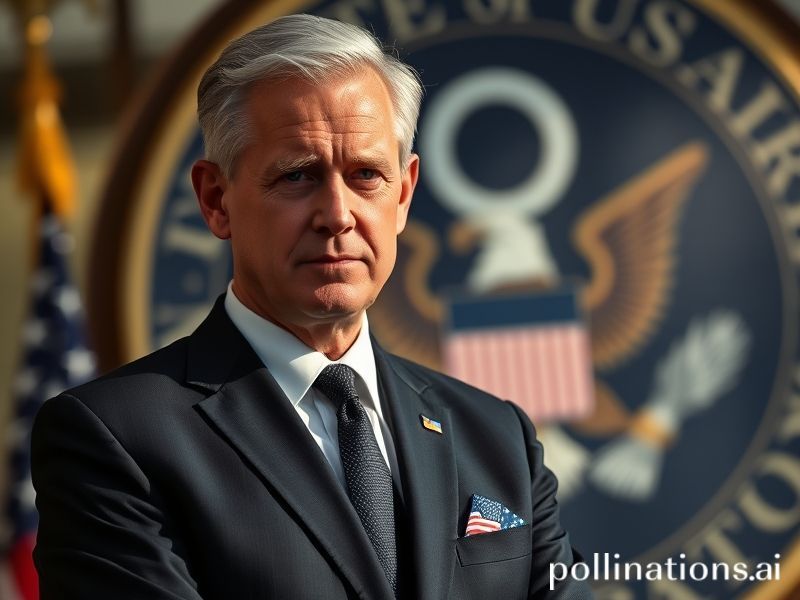Ric Grenell’s World Tour: How One Man’s Carry-On Became U.S. Foreign Policy
Ric Grenell, the man who once served as Donald Trump’s acting Director of National Intelligence for the length of a European vacation, has lately been auditioning for a far grander role: self-appointed viceroy of the entire planet. From Tirana to Tegucigalpa, foreign ministries now keep a “Grenell folder” next to the one marked “Act of God – Unlikely.” The dossier is thin but troubling, like a budget airline safety card: you hope it never matters, yet you still glance at it during turbulence.
Grenell’s most recent world tour—call it “Regime Change Lite”—has taken him through Kosovo, Serbia, and assorted Balkan back rooms where Wi-Fi is spotty but the grudges are 4K. His mission, as he explains it between Fox hits and Instagram selfies, is to “finish the job Trump started.” Which job? The one where the United States experiments with treating diplomacy like a timeshare pitch. In Pristina last month he reportedly told local leaders that if they didn’t sign a Serbia-Kosovo “economic normalization” deal by Friday, Washington would remember them the way it remembers the metric system: vaguely, and with contempt. The local press translated the remark as “sign or we’ll Venmo you into oblivion.” The clause about mutual recognition of Jerusalem as Israel’s capital was quietly slid in on page 47, between provisions on rail gauges and intellectual-property rights for pop stars nobody’s heard of since 2003. Everyone signed, because everyone wanted the photo-op more than they wanted sovereignty.
Europe, meanwhile, watched from the mezzanine, sipping lukewarm prosecco and pretending not to notice that the continent’s own five-year dialogue had just been Trump-branded like a casino steak. Brussels issued a statement so bland it could have been autocorrected from the original Latin. Berlin muttered something about “transatlantic irritants,” which is diplomat-speak for “your guy is spraying Febreze on a dumpster fire.” Paris simply scheduled another emergency meeting about emergency meetings.
Across the Atlantic, Latin America has begun receiving Grenell’s attention like a dental appointment you keep rescheduling. In Guatemala he advised the government to move its embassy to Jerusalem “before the discount expires.” Honduran officials were told that recognition of Juan Guaidó as Venezuela’s legitimate president could be traded for a tariff exemption on bananas and, inexplicably, a Netflix development deal. When asked what constitutional authority an ex-ambassador possesses to rearrange hemispheric alliances, Grenell replied, “The same one that lets teenagers run hedge funds.”
The global significance here isn’t that Grenell might succeed—history suggests that hastily inked Balkan agreements age about as well as unrefrigerated shellfish—but that failure now travels at fiber-optic speed. Every hastily promised factory or phantom investment creates a new constituency of disappointed mayors, each nursing a grudge and a Twitter account. In an age when foreign policy is conducted by subtweet, that is how “soft power” ossifies into brittle resentment, like leftover airline pretzels.
Still, one must admire the efficiency: one man, a carry-on, and an unlimited-data phone plan are apparently enough to redraw borders that obstinate Europeans have failed to finalize since the Habsburgs misplaced their last empire. If nothing else, Grenell has proven that globalization’s final export is the American talent for turning geopolitics into a reality show where the prize is simply not being voted off the island. The ratings, measured in retweets and canceled summits, are surprisingly robust.
Conclusion: Whether Ric Grenell is a herald of post-institutional diplomacy or merely its most flamboyant symptom remains an open question—one best debated over rakia in a Sarajevo bar that still hasn’t replaced the sign from the 1984 Olympics. What is certain is that when superpowers subcontract foreign policy to charismatic freelancers, the world ends up with agreements that expire faster than green-card marriages. And somewhere in a quiet corner of the State Department, a career diplomat is updating her LinkedIn profile, wondering if expertise still counts as a marketable skill or merely an affectation, like cursive or the Geneva Conventions.







